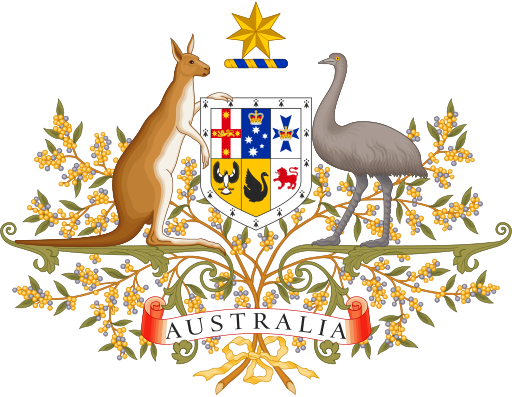- Information
- iGambling
- Blask
- prev
- next
Gambling regulation
-
Online casino:Illegal
-
Online sports betting:Regulated
-
Gambling in detail:
Population
- Population: 24238610 people.
- Official Language: English
- HDI: 0,946
- Salary: $3493
- Poverty rate: 1%
- Gini: 34.3%
- The believing population: 34%
- Main religion: Christianity (67.3%)
- Second religion: Atheism (24.2%)
Harmful habits
- Alcohol: 9.5 litres/year
- Smoking: 13.6%
Internet
- Internet users: 97.6%
- Mobile Internet: 59%
- Landline Internet: 38.7%
- Internet speed: 76.5 Mbps
- Country Top Level Domain: .AU
General information about the country
-
Country name:Australia
-
Code (2-digit):AU
-
Continent:Australia and Oceania
-
Country level:Tier 1
-
Capital:Canberra
-
Country area:7686850 sq km.
-
Telephone code:61
-
Currency (code):Australian dollar (AUD)
Geographical features of the country
Administrative division into regions
Australian Capital Territory, Northern Territory.
Outer Territory (3): Cocos Islands, Norfolk Island, Christmas Island.
State (6): Victoria, Western Australia, Queensland, New South Wales, Tasmania, South Australia, Victoria, Western Australia.
Features of the country
The modern territory of the country was partially or fully occupied by the following states: British Empire (now Great Britain).
Australia is washed by seas: Coral Sea, Tasman Sea, Arafura Sea, Timor Sea.
Australia has access to the following lakes: Eyre (Kati-Tanda), Torrens, Gardner, Mackay, Frome, Alegzandrina, Carnegie, Disappointment, Amadius, Great Lake, Hindmarsh, Bulumbait, Bonny, Grace South, Grace-North, Kanagulk, Burberry.
The following rivers flow through the territory: Darling, Murray, Marrambidgee, Cooper Creek, Warrego, Locklan, Paroo, Georgina, Flinders, Gascoyne, Diamantina, Ashburton, Victoria, Murchison, Fortescue, Finke, Fitzroy, Berdekin, Barwon, Condamine and others.
In the water area of the country there are straits: Bass Strait, Torres Strait.
Australia owns the islands: Tasmania, Melville, Kangaroo, Groote Island, Fraser, Bathurst, Flinders, King, Mornington, Derk Hartog, Cape Barren, Hinchinbrook, Herd, Bruny, Croker, Howard, Elko, Whitsunday, Wanderlyn, Marchinbar and others.
Mountains in the territory include Mawson, Big Ben, Kosciuszko, Townsend, Tuinam, Ramshead, Etheridge, Carruthers, Ossa, Legs Tor.
There are volcanoes on the territory: Big Ben.
There are deserts on the territory: Victoria, Big Sandy, Tanami, Gibson, Simpson, Little Sandy, Strzelecki.
Famous caves on the territory of the country: Bulita, Jenolan, Mini-Martin, Corra-Lin, Growling-Suollet, Mulamulang, Queenslander Cave, Kokelbiddy, Kolong, Kubilai Khan, Eagle-Nest, Mamutova, Kazad-Dum.
Gambling regulation
-
Online casinos:Illegal
-
Online sports betting:Regulated
Read more about regulation
In Australia, the Australian Communications and Media Regulator (ACMA) continues to persistently oppose the shadow iGaming market. To be fair, ACMA's tough innovations are justified. Residents of the country are world leaders in gambling expenditures: the average Australian player spends more than $1.5 thousand a year. For comparison, in Ireland the annual figure is $713, in the United States - $261, in Britain - $169.
- Online casinos are banned. There is a procedure for blocking unlicensed ones, which is handled by the regulatory body ACMA (Australian Communications and Media Authority). At the request of ACMA, casino domains are sent to blocking providers.
- Only in one administrative unit of Australia - the Server Territory - you can legally obtain a license, and only for betting.
Top brands in the country
- El Royale Casino
- 22Bet
- Red Dog Casino
- Slots Empire
- Wild Casino
- 20Bet
- Boho Casino
- Ignition Casino
- Joe Fortune
- Slots Gallery
(as of November 2024)
Top payment systems
- Credit cards;
- MiFinity;
- CashToCode.
(data as of autumn 2024)
Top slot machines
- Diamond power: hold&win
- Wolf treasure
- Aztec fire 2
- Sun of egypt 3
- Gold express
(by number of bets for autumn 2024)
Gambling work files
Online Gambling in the country
Australia is one of the largest gambling markets with a highly engaged population.
The first online casinos appeared in the 90s with the development of the Internet. And already in 2001 there was a legislative act IGA, regulating online gambling. It should be understood that Australia was and remains a strictly regulated market, where there is an active fight against illegal operators.
Advertising of online casinos is banned in Australia. Both offshore brand sites, affiliate sites and casino mirrors are blocked.
Player profile
- Men: 72%
- Women: 28%
- Average age (m): 44
- Average age (w): 40
- Main activity of players: after 19 hours local time.
- Most active days of the week: Friday, Saturday.
Devices
- Mobile phones: 81%
- Desktop: 17%
- Tablets: 2%
Other player characteristics
Most people in Australia get paid at the end of the month (29-31). These are the days of peak activity and it makes sense to give players an extra bonus to incentivise them to come to your casino.
From an interesting observation: Australians often spend family holidays away from home. On such days, the activity drops significantly.
Separately, it can be noted that recently there has been an increase in the tendency to play in cryptocurrency. This is due to the card blocking that players sometimes face.
Australia is a very profitable market, but it is worth remembering the risks.
Firstly, the projects of illegal operators are regularly blocked, so you should have a mirror in reserve to guide players to.
Secondly, players' credit cards are periodically blocked, so players often prefer alternative methods to top up. Without such methods, getting onto a given geo will be problematic.
Also, it is worth remembering the particularly high competition in the market, so the market entry should be carefully prepared in terms of product (welcome offer, regular offers, games, payment methods, retention mechanics, etc.).
Another attempt to stop the illegal iGaming market
Only sports betting is legal in Australia, and the large gambling audience lacks diversity in the iGaming industry. Therefore, it can be argued that thorough measures from the authorities are indeed detrimental to licensed betting operators and significantly reduce the revenues of the sector as a whole.
Nevertheless, despite the potential for growth in the country's legal gambling sector, all these opportunities are now effectively in the hands of the black market. We tell you what other reforms await licensed operators in this fight for survival, and provide data on the scale of the illegal iGaming industry in Australia.
Gambling adverts are an abode of evil for the public
There is an ongoing debate about gambling advertising regulations in the country. It started back in 2023 when Australian politician Peta Murphy proposed 31 recommendations to normalise gambling in the Australian community.
These included a phased three-year plan to eliminate all forms of gambling advertising. At this point, the recommendations are still under discussion, but one of the regulations for this area has been highlighted for quicker consideration.
The Australian government has launched an initiative that will restrict gambling advertising in stadiums during major sporting events.
The purpose of the restriction is to reduce the impact of advertising on young audiences, as it makes young people perceive betting as an integral part of sports culture. It is known that about 46 per cent of Australians between the ages of 18 and 24 participate in online betting.
In this situation, bookmakers may suffer significant losses, as this type of advertising has noticeably contributed to their recognisability in the media space.
New player identification requirements for betting operators
The tightening of the customer identification procedure (KYC) was introduced back in September 2023. Therefore, operators had one year to prepare for the stricter rules.
Companies are now prohibited from allowing users to gamble until they have verified that the customer is who they say they are.
This implies that companies are required to implement robust identity verification systems and procedures to quickly and accurately verify the documents submitted to avoid any criminal elements and to recognise individuals on the National Self-Exclusion Register.
BetStop performance
Over 30k people in Australia have joined the BetStop National Self-Exclusion Programme since its launch in August last year.
The majority of registered players (15k) are young adults under the age of 30. Consumers aged between 31 and 40 were the next group, accounting for 30 per cent of all registrations. They were followed by the 41 to 50 age group with 12% and another group from 51 to 60 with 6%.
As for the terms for which people voluntarily gave up gambling, about 12 thousand Australians did it for life. The same number of people chose the term from three months to two years.
It is known that 7.3 thousand people completed the self-exclusion process or cancelled it early. However, there is no guarantee that the number of former self-excluded people will not decide to ‘snap’ and turn to gambling platforms.
BetStop's effectiveness is directly related to the volume of the black market, which exceeds the scale of legal activity in the country, which is limited solely to sports betting.
This means that Australians who are members of the national self-exclusion programme can visit the vast number of active offshore sites in the country without any restrictions, thus exacerbating their addiction to gambling on illegal platforms.
Thus, the lack of diversity in Australia's gambling industry, coupled with the growing number of illegal operators, calls into question the effectiveness of the government's initiatives aimed primarily at protecting young people.
What are the implications for the industry?
The Australian Institute of Health and Welfare is confident that ‘gambling is a serious public policy issue in Australia, impacting the health and wellbeing of individuals and families in a variety of ways’. As such, the country is constantly introducing new laws and standards for the sector.
The tight regulatory environment and lack of diversity in an industry where only online sports betting is allowed creates an unfavourable environment for users and makes legal operators highly uncompetitive.
Unwilling to become part of such countermeasures, players opt for more diverse illegal platforms available around the clock, despite the ASMA's continuous efforts to block them. As a result, there is a significant exodus of players offshore.
The state is suffering huge financial losses, and instead of considering legalising online casinos, the authorities continue to increase pressure on legal betting operators.
If this policy continues, Australia risks becoming a global leader in gambling losses rather than a global and promising gambling region.
Gambling affiliate programmes that accept traffic from this country
- Blask data from: 06/03/2025
- The data for this section was provided by the analytical service Blask.com. Currently, the service's database contains information on 62 countries and more than 2,500 brands. You can view all available countries with Blask statistics at this link.
- Share
- prev
- next












